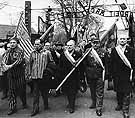
|
|
|

|

|

|

|
|
Click on an image to see a larger, more detailed picture.
|
|
|
|
|
| PROLOGUE: Roots of the Holocaust |

|
pg. 19 |

|
|
|
|
| |
|
The Holocaust's impact lives on. In that way the past is present. When the Holocaust is concerned, moreover, the presence of the past stretches awareness back and forth. Efforts to understand the Holocaust take one back in time to the origins of the Jewish people and the modern German state. It leads to a consideration of anti-Jewish discrimination that was rooted in Christianity as well as in racial stereotypes that preceded the existence of National Socialism.
|
 Auschwitz survivors reenter the camp in April 1965, 20 years after its liberation by the Russians.
Auschwitz survivors reenter the camp in April 1965, 20 years after its liberation by the Russians.
Photo: AP/Wide World
|
|
As the 21st century unfolds, the Holocaust recedes farther into the past. As something that happened in an earlier century, it may appear to be increasingly distant from us. Nothing, however, could be further from the truth. The genocide happened; it casts shadows upon the earth. The genocide makes no darkness unthinkable, no destruction unimaginable, no devastation impossible. Post-Holocaust ethnic cleansing in Kosovo and genocides in Bosnia and Rwanda testify to that. Only if the Holocaust's warning is heeded and not forgotten can the cry "never again!" keep from being mocked by a resounding "again and again!" The warning can be best heeded by starting at the beginning. We start by paying attention to broken eyeglasses that belonged to a German journalist named Fritz Gerlich.
|
 Although a political rightist, Munich newspaper editor Fritz Gerlich abhorred Hitler. His opinion was unwavering throughout Hitler's rise to power, and ultimately cost Gerlich his life.
Although a political rightist, Munich newspaper editor Fritz Gerlich abhorred Hitler. His opinion was unwavering throughout Hitler's rise to power, and ultimately cost Gerlich his life.
Photo: Bilderdienst SYddeutscher Verlag
|
|
Fritz Gerlich's Spectacles Born in 1883, Dr. Fritz Gerlich grew up in Munich. There he studied university science and history, writing a dissertation on a medieval Germanic emperor to obtain his doctorate. Hampered by the poor eyes that led to his wearing the steel-rimmed spectacles for which he became well known, Gerlich was unable to serve in the German Army during World War I. Instead he worked in the national archives while becoming increasingly attracted to political journalism. Staunchly defending German nationalism in the aftermath of his country's defeat in 1918, Gerlich soon became editor-in-chief of the Münchener Neueste Nachrichten, one of the city's most conservative newspapers. By the early 1920s, Gerlich was a significant figure in Germany's postwar nationalist movement. In the spring of 1923, he received a visit from a controversial man, six years his junior, who was the leader of the right-wing National Socialist German Workers' Party. That man was Adolf Hitler.
|
|

|

|

|

|
 c. 4th-2nd centuries bce: Greeks attempt to destroy Judaism and impose Hellenistic culture and religion on the Jews. The Jews fight back. (Jews still celebrate these events in their holiday Chanukah.)
c. 4th-2nd centuries bce: Greeks attempt to destroy Judaism and impose Hellenistic culture and religion on the Jews. The Jews fight back. (Jews still celebrate these events in their holiday Chanukah.)
|
 c. 3rd century bce: The Pentateuch (first five books of the Jewish Scriptures) are translated into Greek. This version becomes known as the Septuagint.
c. 3rd century bce: The Pentateuch (first five books of the Jewish Scriptures) are translated into Greek. This version becomes known as the Septuagint.
|
 140 bce: Judea and Rome are allies.
140 bce: Judea and Rome are allies.
|
 63 bce: Pompey, one of the three rulers of Rome, conquers Palestine.
63 bce: Pompey, one of the three rulers of Rome, conquers Palestine.
|
 c. 4 bce-30 c.e.: This is the approximate lifetime of Jesus of Nazareth. Pontius Pilate, the Roman governor of Judea, orders the execution of Jesus, who has been opposed by some Jewish leaders. A complication is that at this time many Jews belong to distinctly different sects of Judaism: The Sadducees are an aristocratic, priestly group who collaborate with the Roman authorities to maintain the status quo; the Pharisees are devoted to the traditions of the Mosaic laws and seek religious purity among God's chosen people; the Essenes withdraw from society into quasi-monastic conclaves; the Zealots agitate for political freedom for Judea from Roman rule; and the Jewish Christians believe Jesus is the promised Messiah.
c. 4 bce-30 c.e.: This is the approximate lifetime of Jesus of Nazareth. Pontius Pilate, the Roman governor of Judea, orders the execution of Jesus, who has been opposed by some Jewish leaders. A complication is that at this time many Jews belong to distinctly different sects of Judaism: The Sadducees are an aristocratic, priestly group who collaborate with the Roman authorities to maintain the status quo; the Pharisees are devoted to the traditions of the Mosaic laws and seek religious purity among God's chosen people; the Essenes withdraw from society into quasi-monastic conclaves; the Zealots agitate for political freedom for Judea from Roman rule; and the Jewish Christians believe Jesus is the promised Messiah.
|
|
|
|
|
| PROLOGUE: Roots of the Holocaust |

|
pg. 19 |

|
|
The Holocaust Chronicle
© 2009 Publications International, Ltd.
|
|
